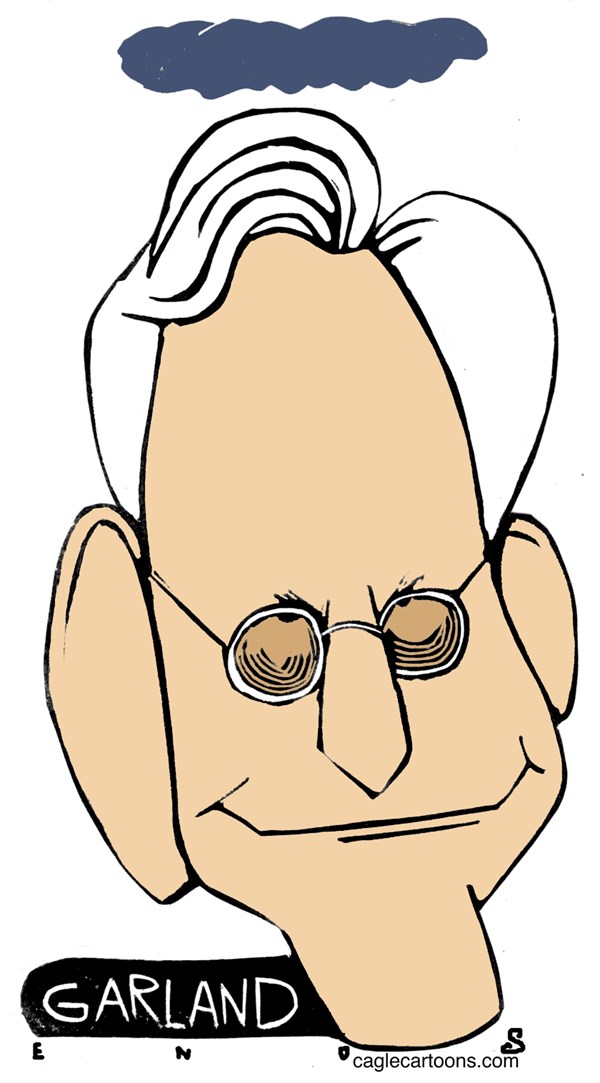
The nomination of Merrick Garland to the U.S. Supreme Court is all about politics. There’s nothing wrong with that. Politics is governing, with no argument here about what the meaning of “is” is.
Mr. Garland is a liberal’s liberal, and so is Barack Obama, but the president is under no illusion that he can make good his nomination. Republican senators have vowed to prevent it, leaving themselves no wiggle room. By all accounts, Mr. Garland, 63, is everything the president says he is: a man of decency, modesty, integrity, even-handedness and excellence.
Well, not quite even-handed, by the reading of some of his decisions against the Second Amendment. President Obama, who knows better and has to pretend he doesn’t, appealed to the Senate to “play it straight” and confirm Mr. Garland because the Supreme Court is “supposed to be above politics. It has to be. And it should stay that way.”
Even Mr. Obama, the onetime law-school professor, chokes on goo-goo talk like that. Anyone who didn’t flunk junior-high civics understands that the Supreme Court stands up to its neck in politics. That’s why it presides in one of the most impressive marble temples on Capitol Hill. The best of the justices puts politics aside to give the law and the Constitution its due, and that’s enough to ask of any justice. (Some of us knew some of them before they were virgins.)
Nevertheless, the politicians, Barack Obama first among them, talk of politics as something an honest justice must rise above, when politics is why and how Washington and the republic exist at all. You might as well expect a cook to rise above groceries, a physician to rise above his pills and potions, or a courtesan to rise above her temptations in silk and lace.
The president knows this and can take pride in finding a man of Mr. Garland’s stature to participate in his shrewd stagecraft of campaign politics writ large. The roles of the actors have rarely been so sharply defined. The president and the Democrats defend justice, fair play and good faith, demanding only what they call the president’s Constitutional right to appoint a justice.
The Republicans vow to defend their Constitutional right to advise and consent, even if that means advising the president that they do not consent, and he should send them another candidate. They’re playing by the book last used in 2007 by Sen. Chuck Schumer, seeking to block the appointment of John Roberts as chief justice.
Mr. Schumer set out to prevent President George W. Bush from appointing justices for the 19 months remaining until the next election, and made neither excuse nor alibi about why. “We should reverse the presumption of confirmation,” the Democratic gentleman from New York told his colleagues. “The Supreme Court is dangerously out of balance. We cannot afford to see Justice [John Paul] Stevens replaced by another [John] Roberts, or Justice [Ruth Bader] Ginsburg by another [Samuel] Alito. . . I will recommend to my colleagues that we should not confirm any Bush nominee to the Supreme Court except in extraordinary circumstances.” The “extraordinary circumstance,” of course, would be the unlikely appointment of a liberal’s liberal.
The Republicans should be similarly plain and direct in exercising their right to oppose Mr. Garland. He’s no stealth candidate. His record is bright and clear, and could, in the endorsement of The New York Times, “tip the ideological balance to create the most liberal Supreme Court in 50 years.”
Mr. Garland is a pleasant fellow, a friend of several Republican senators, and the right man for Mr. Obama’s stagecraft. The president casts the confirmation proceedings in terms of fairness and good manners. If the Republican senators won’t even give him a hearing, what would that say about law and procedure? But a hearing and a vote, as the president well knows, would be a waste of everyone’s time, and not a very nice thing to do to Mr. Garland.
He made the ritual visit Thursday to Capitol Hill, to say hello and shake hands with senators, but it was an empty gesture. In addition to all the nice things the president said about him, he’s a good sport, too. Several Republican senators traded handshakes, but he did not stop for all. He got a polite telephone call from Mitch McConnell. Their argument, that the next president should fill the seat of Antonin Scalia only after the people have spoken in November, is persuasive as politics.
So why go through irrelevant and useless ritual now. “We can’t say ‘let the people speak’ and then say ‘no, you can’t,’” says Sen. Lindsey Graham. “If you’re going to let the people speak, you let them speak and then honor their choice.”
Comment by clicking here.
JWR contributor Wesley Pruden is editor emeritus of The Washington Times.



 Contact The Editor
Contact The Editor
 Articles By This Author
Articles By This Author